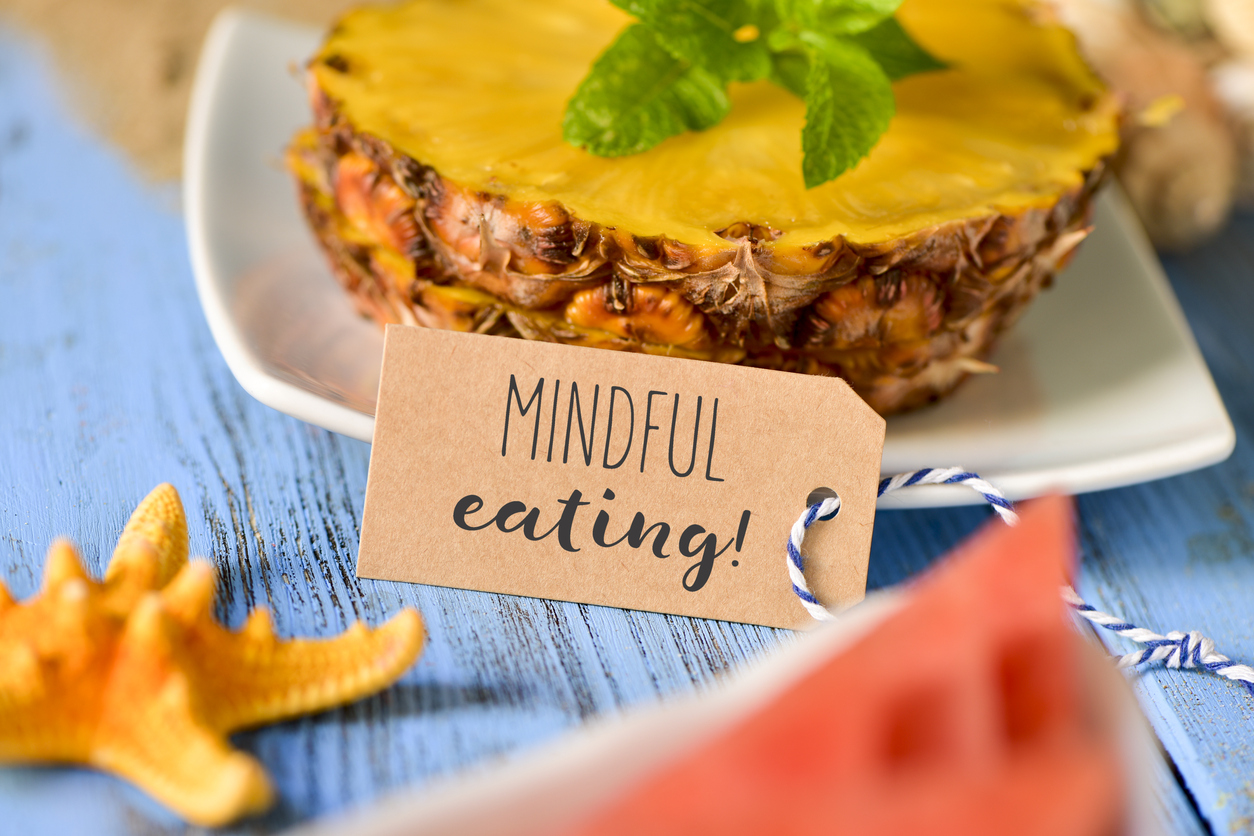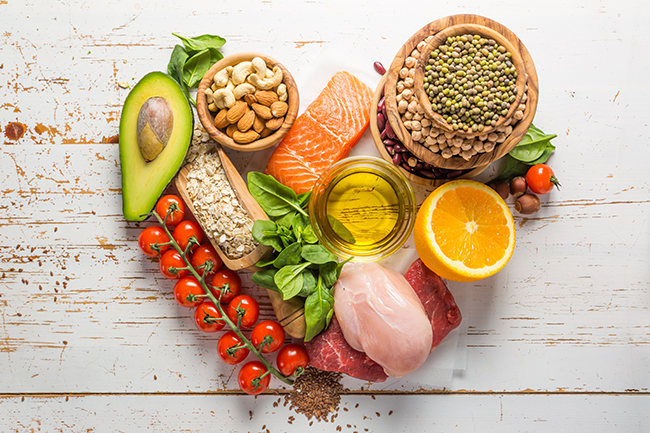Charlotte Willis shows us the importance of taking time out and reconnecting with our food…

When was the last time you really sat down, and just ate? Think about it for a minute. Now I’m not talking about your daily gluten-free quinoa porridge from Pret on your busy morning commute to the office. Nor wolfing down a salad on the tube between meetings. Or grabbing a quick ready-meal on the way home, to enjoy in front of the latest episode of your favourite TV show, before tiredness takes over and you crawl into bed.
Allow me to re-phrase that question. What I really mean is this: when was the last time you consciously ate a meal? You took time to appreciate every morsel, every flavour and texture? You savoured your meal with appreciation and calm mind? Can’t recall? Well, that makes two of us.
Shifting focus
It’s hard to believe given my generation’s obsession with documenting just about every meal or snack on social media. Everything from smoothie bowls and restaurant finds to the ultimate bread and healthy snack, every social account we have online is flooded day after day and by various bloggers and foodies, filling our feeds with their daily nourishment. However, despite being obsessed with food, the vast majority of us are consciously disconnected with our meals and mealtimes.
Nutritional psychology is a growing scientific area of research, focusing on the link between emotions, neurochemistry and the subsequent formations of eating behaviours and habits. Current research is telling us one thing: we aren’t paying enough attention to our meals, the consequences of which are reflected in our bodies.
Who has time to eat these days?
Let’s be honest with ourselves here, we live in the 21st century where the city, your business or workplace, and so it seems more than half of the general population, all refuse to sleep. Time is precious. I know few people who have a regular eating pattern locked down and even fewer who bring their own lunch to work with them. In fact, it’s a regular occurrence these days to hear ‘Oh I’ll just grab a sandwich’ or ‘I’ve skipped breakfast because I had to get the kids ready’. Which begs the question: when did we become so disconnected with our food? And just how is this attitude affecting our bodies and health?

Good to go?
It turns out that when it comes to our meals, the way in which we eat has changed. Gone are the days where families and friends would gather around a table to share and enjoy their food over conversation. Yes, this idyllic scene of the suburban mealtime dream has been replaced. We simply don’t have the time for that, sorry.
While doing research for this article, I travel home to see my friends and family on a regular basis and commute every day to work and university by public transport. I’ve become more aware than ever of just how much us Britons eat on the go. We love it. Everything from whole meals, to snacks, smoothies and copious amounts of coffees (guilty – very guilty). Commuting time and travel time has turned into meal time with an average of £225 per person every year spent on food-on-the-go, the highest spending rate in Europe.
Distracted eating
Mealtimes have turned into an opportunity to scroll through social media, to catch up on the latest series of Game of Thrones (has anyone else never watched a single episode?) or blidly thumb through other channels. Whatever you’re doing while eating, according to newly emerging research, if you are doing anything other than, well… eating, you’re doing too much.
Distracted eating. This is the term used by nutritional psychologists to describe how the majority of our society chooses to re-fuel our bodies.

A study by a group of researchers at the University of Birmingham examined the impact of distraction (anything from reading a book to working or watching television) on the amount of food consumed both initially and throughout the rest of the day. They concluded that eating while under distraction increased both the initial amount of food eaten and indeed the total number of calories consumed at each setting. What’s more, they also found that those who ate while distracted were more likely to overeat for the rest of the day.
So what’s going on in our brains and bodies? When we eat under distracted circumstances our brain has to divide our attention between consciously acknowledging the food we are eating and the task the distraction we are performing while eating. Therefore, we don’t fully register just how much we are consuming, and are likely to overeat. Bad news for those of us who are watching our waistlines.
Distracted eating and gluten-free diets
Distracted eating habits can affect even the most healthful of individuals. Those annoying people we know who have the squeakiest of clean diets, and who come in every day with their pre-prepared lunches and energy balls are not exempt from distraction. But for those of us with stomach complaints, sensitivities or gastric issues, eating in a distracted and sporadic manor can exacerbate our symptoms further.
Distracted eating habits can cause us to rush our food, increasing the intake of air into the gastro-intestinal system leading to bloating, inflammation and gas. The bacteria in our gut can also become affected when we eat without a regular pattern, or inadequately chew our foods due to lack of attention – forcing our bacteria to go into overload attempting to digest your food.
Having a hard day? Eating in a stressed environment also prevents us from adequately digesting our food. The distraction might not be obvious, but while the body is in a stress response (which in itself is a distraction internally) it causes a reduced flow of blood to the stomach. When we are under stress, we produce less stomach acid to digest our food. The result? Fewer vitamins, minerals and macronutrients are broken down and absorbed. That means that no matter how nutritious your meal may be, if you’re eating under a level of stress or are highly distracted, you’re not going to get the maximum nutritional benefits. Eating al-desko has never been so bad for you.
Mindfully eating
Mindfulness has taken off in popularity over the past few years, perhaps due to the number of us who feel constantly under pressure and stress? Nonetheless, mindfulness is a practice that can be applied readily to our dietary habits to help us reconnect with every mouthful and savour every bite.
Mindfulness, in case you weren’t aware or have been hiding under a rock, is a practice of observation and appreciation which has its roots in Buddhism. Mindfulness practices allow us to appreciate
the simpler and intricate details of our lives, aiding calmness, focus and clarity in an increasingly foggy world. In terms of eating, mindfulness teaches us to be more appreciative of the sensory qualities of our meals, to slow our eating down and to make food the focus of our mealtimes rather than an excuse to distract ourselves. In doing so, we allow our bodies to fully digest and maximise the nutritional gain from our food. Mindful eating practices have even been shown to help alleviate symptoms of IBS, gastritis and other digestive complaints. What’s not to love?

The simple 7
Below are my seven top tips for eating mindfully. By practicing these techniques at every meal, you’ll learn to appreciate and savour your food, developing a new relationship with what you put into your body and how it makes you feel. Mindful eating could even help you lose weight and feel a higher level of satiety throughout the day.
1. Switch off
When you come to eat a meal, snack or any food/beverage, try and devote your attention towards this action only. Whether this means turning off the TV in favour of a radio, closing your book or putting your phone to one side – you’re more likely to eat slower and savour every flavour.

2. Slow down
You may only have half an hour to eat lunch, but rushing down your food is not going to be beneficial to your gut or general health in the long run. Rushing your food increases gas intake, resulting in bloating and discomfort. Focus on chewing each mouthful 20-25 times – you’re more likely to feel satisfied at the end of your meal.
3. Take a food break
Eating on the go? That’s a big no. Mindfulness teaches us that eating on the go, whether that’s on your busy commute or simply just walking, encourages the body to divert your attention away from digesting your food. Instead, plan ahead. Take 20 minutes extra in the morning to have breakfast the house, or plan in some time to yourself in the afternoon to snack rather than eating on the go.
4. Stop. Think. Eat
Before you decide to gorge yourself on the entire contents of your fridge after a long day, take 5 minutes to appreciate how your body feels. This sounds a little hippy-dippy, but take it from me, it really does work! By reducing impulsive eating decisions, and taking time when you come in from work to listen to your body and calm your mind, we are far more likely to make sensible decisions.
5. Chow down with chopsticks
About a month ago, I decided to try eating every meal with chopsticks. The result? The time taken for me to eat a regular salad increased by around 10 minutes. Smaller mouthfuls and taking a longer time to eat can help reduce gastric issues.
6. Savour your food
Once you’ve mastered the techniques above, try focusing your mind on what you are eating. Take a note of every mouthful, the flavours, the textures and taste. Doing so has made me introduce more flavours and a wider range of textures into my own foods and really allows you to focus on your meals without distraction.
7. Learn to stop
When you feel full, stop eating. Sounds simple but you’d be surprised at the number of times you’ll power through a meal at the rate of Usain Bolt being chased by a tiger, only to find that you now feel overly-full, bloated and uncomfortable. By learning to stop eating when we feel full, we allow ourselves to eat without overloading our bodies and with a higher level of appreciation. You’ll be surprised at how much you actually need to eat in order to satisfy your body.
 Charlotte Willis is a student researcher of nutrition and human disease. Studying to become a Doctor of Human Nutrition, she is particularly interested in wholefood, plant-based nutrition and healthful lifestyle intervention in the prevention and reversal of chronic human diseases.
Charlotte Willis is a student researcher of nutrition and human disease. Studying to become a Doctor of Human Nutrition, she is particularly interested in wholefood, plant-based nutrition and healthful lifestyle intervention in the prevention and reversal of chronic human diseases.
